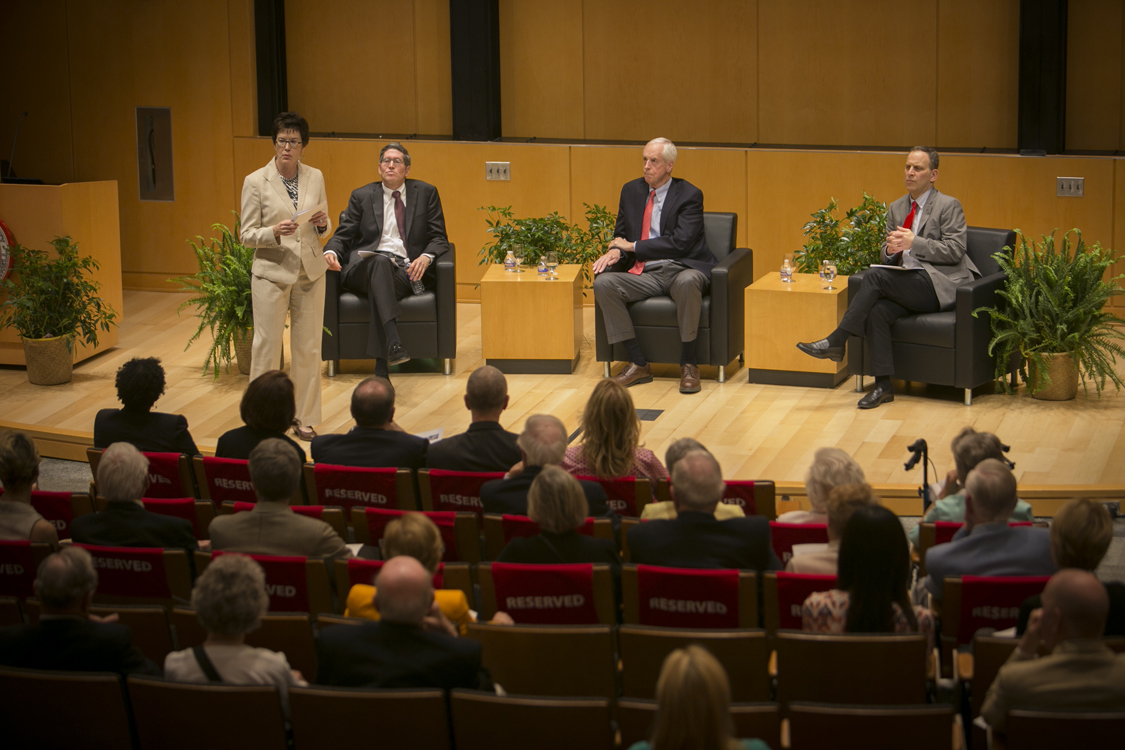Scholars explore Constitution's history in May 26 panel
By Linda B. Glaser

Two of the country’s foremost constitutional scholars – Michael Klarman and Michael Dorf – offered their thoughts on the history of the U.S. Constitution at a panel during the May 26 Klarman Hall dedication.
Interim President Hunter Rawlings, Cornell president emeritus and professor emeritus of classics, opened the panel he moderated with reflections on James Madison, America’s “greatest scholar-president.”
Rawlings described how Madison spent a year and a half reading about confederacies to prepare for the Constitutional Convention and arrived the best prepared of all the delegates – and was thus the “major framer” of the Constitution.
Klarman, the Kirkland & Ellis Professor at Harvard Law School, based his talk on his forthcoming book, “The Framers’ Coup: The Making of the United States Constitution,” in which he explains how and why the constitution that was ratified differs from what was expected.
The ratified Constitution dramatically shifted power from the state to the federal government and limited populist power, explained Klarman. For example, it gave the federal government almost unlimited taxing power and military power, along with the power to regulate commerce – and it dramatically extended terms of office.
“The goal of the framers was to break the tight connections between the representatives and the people and to ensure that the federal government never fell under the sway of populist demands for debt relief laws, as had happened in the state level in the 1780s,” said Klarman.
One of the reasons the anti-federalists failed, Klarman said, was that they had no advance warning of the nationalist turn the Convention would take. “It turns out the agenda existed in one person’s head: James Madison,” said Klarman. “Madison was the only one thinking systematically and coming up with a plan beforehand … he presented the convention on day one with the Virginia Plan, which moved them dramatically in an anti-populist, nationalist direction.”
Dorf, the Robert Stevens Professor of Law, reflected on how the Constitution has changed since the Philadelphia Convention and the relationship between populism and the Constitution.
“Appointments to the Supreme Court and the lower federal courts are not the only – and perhaps not even the most important – mechanism by which politics affects the course of constitutional law,” Dorf noted. He listed the mechanisms by which constitutional change occurs without a change in Supreme Court personnel, including constitutional amendments (which are rare), failed constitutional amendments, the enactment of landmark legislation, and changes in the public’s attitude.
Dorf explained, “A constitutional challenge to major legislation will be more likely to succeed before that legislation has become broadly embedded in the law and society.”
Changed attitudes and values can play a key role in translating social change into legal change, said Dorf. “Often the simplest explanation for why the Constitution is read the way it is at any given moment is that the reading reflects contemporaneous social attitudes. Who sits on the Supreme Court matters a great deal, but when the court decides a question also matters a great deal.”
And while backlash to events is just one of the mechanisms by which constitutions change over time, Dorf contended it is “arguably the most important, because constitution writers and amenders react to past evils; they institutionalize backlash. The German Constitution – especially its protection for human dignity – institutionalizes backlash against Nazism … The Reconstruction Amendments embody backlash against slavery and caste.”
Linda B. Glaser is a staff writer for the College of Arts and Sciences.
Media Contact
Get Cornell news delivered right to your inbox.
Subscribe